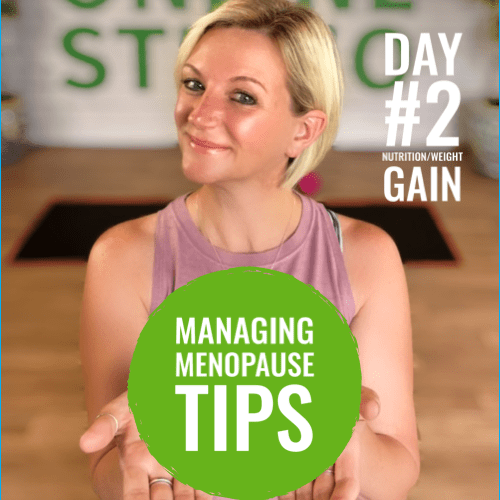
SOOOOO having sat down to compose this post I realise I have so much to share with you … so much in fact that I’ll need to break the nutrition content down into several posts …
Today I’ll touch on the types of food that you should be aiming to eat/avoid to manage menopause symptoms and avoid weight gain.
I will share nutrition information with you Tues – Frid and then finish our week with exercise tips Sat – Sun. It’s also really important for me to point out that every female menopause journey is different and the follow is general/generic advice.
I also recommend your read yesterday’s post: This will help you get so much more out of the info I’m about to share.
💖Hormones and excess blood sugar: When you eat excess blood sugar, your body releases the hormone insulin to help metabolise it. However, as you age, your body becomes less sensitive to insulin. This, combined with a change of oestrogen, progesterone & possibly higher cortisol levels, can lead to high blood sugar levels, which if not effectively metabolised can contribute to weight gain, especially around the midsection.
💖Resistance training: Can help really help improve your metabolism and energy expenditure … I’ll cover this in detail on days 6 & 7.
💖Nutrition: One of the best ways to manage menopause symptoms and avoid midsection weight gain is to eat a healthy diet. This means eating plenty of protein, fibre, vegetables, and limit refined sugar, caffeine, and alcohol.
💖Protein: Are you eating enough? Protein helps to build and maintain muscle mass, which is important for maintaining a healthy weight and metabolism. It also helps to reduce hunger and cravings, and can improve energy levels. Good sources of protein include lean meats, poultry, fish, eggs, dairy products, legumes, and nuts.
💖Fibre: Helps to keep you feeling full and satisfied after meals, which can help to reduce calorie intake and promote weight loss. It also helps to regulate blood sugar levels and cholesterol levels. Good sources of fibre include fruits, vegetables, whole grains, and legumes.
💖Vegetables: Are packed with nutrients that are essential for good health, including vitamins, minerals, and antioxidants. Eating plenty of vegetables can help to improve menopause symptoms, such as hot flashes, night sweats, and mood swings. It can also help to reduce the risk of chronic diseases such as heart disease, stroke, and cancer.
💖Limit refined sugar, caffeine, and alcohol: Refined sugar, caffeine, and alcohol can all trigger menopause symptoms, such as hot flashes and mood swings. They, in particular, can also contribute to weight gain, and I’ll cover these in great detail over the next few days.
So IN GENERAL:-
- Eat plenty of protein-rich foods, such as lean meats, poultry, fish, eggs, dairy products, legumes, and nuts.
- Eat plenty of fibre-rich foods, such as fruits, vegetables, whole grains, and legumes.
- Choose whole grains over refined grains.
- Limit processed foods, sugary drinks, and unhealthy fats.
- Eat regular meals and snacks throughout the day.
- Drink plenty of water.
Eating a healthy diet is one of the best ways to manage menopause symptoms and avoid midsection weight gain.
By eating plenty of protein, fibre, and vegetables, and limiting refined sugar, caffeine, and alcohol, you can improve your overall health and well-being.
I hope this helps
Jayne xxxxx
#menopause #menopausefitness #menopausediet #midsectionweightgain #getfitwithjayne #fitnesstips #menopausetips
